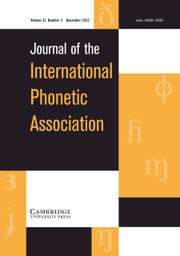Arthur S. Abramson, Professor Emeritus of Linguistics and founding department chair at the University of Connecticut at Storrs, Emeritus Senior Scientist at Haskins Laboratories, and a major figure in the international phonetics community, died on 15 December, 2017 at the age of 92.
Arthur was born in New Jersey in 1925 and, from an early age, was a student of language. In his youth, he was exposed to Yiddish and also studied Biblical Hebrew, Latin, and French; later he would study Judaic Aramaic, Sanskrit, German, and Thai. After a brief time at Rutgers University, he enlisted in the army during World War II, working as an X-ray technician. Upon his return, he completed his undergraduate program at Yeshiva University, majoring in French but also studying the Talmud and Jewish history. He went on to enroll in the graduate program in Linguistics at Columbia University, then led by André Martinet. During his time at Columbia, Arthur studied under Uriel Weinreich, Joseph Greenberg, and John Lotz.
Arthur paused his graduate work at Columbia to spend three years in Thailand on a Fulbright grant, teaching English and linguistics and learning the Thai language, opening an area of study he would return to throughout his life. When he came back to Columbia, John Lotz put him in contact with Franklin Cooper of Haskins Laboratories, who was teaching a course in acoustic phonetics on an adjunct basis at Columbia. This would begin an affiliation with Haskins Laboratories that would last more than six decades. During his early time at Haskins, Arthur was instrumental in a project to record X-ray motion pictures of speakers of various languages (https://archive.org/details/englishxrayfilm, https://archive.org/details/arabicxrayfilm) intended as a language teaching aid (Abramson Reference Abramson, Fowler and Shankweiler2013). For his doctoral dissertation, Arthur undertook a study of the vowels and tones of standard Thai, presenting acoustic data and conducting perceptual experiments using synthetic speech. In this way, he drew on his earlier experiences in Thailand and also contributed to the body of speech research that was being developed at Haskins.
Arthur undertook a wide array of service roles for the academic and scientific communities. The linguistics department at the University of Connecticut, of which he was a founder, grew to be one of the highest-ranked programs in the country during his career. He served as a member of the council of the International Phonetic Association (IPA) from 1985 to 1991, and was a long-standing member of the Permanent Council for the International Congress of Phonetic Sciences. He was also a coordinator of the effort to revise the International Phonetic Alphabet at the IPA's 1989 Kiel Convention, soliciting and compiling input on ‘the principles on which the IPA should be based’ (Abramson Reference Abramson1988). He was an editor of Language and Speech from 1975 to 1987, and served as secretary, vice president, and president of the Linguistic Society of America. Finally, Arthur was a fellow of the Acoustical Society of America, and a long-term Research Scientist and Secretary of the Board at Haskins Laboratories.
One of Arthur's most widely-known research contributions is the seminal paper, Lisker & Abramson (Reference Lisker and Abramson1964), published in the journal Word. This work, which continues to be widely cited, introduced the measure of voice onset time (VOT). VOT, representing the time difference between two articulatory events, namely the release of the upper vocal tract occlusion and the onset of phonation, was shown to capture differences in stop consonant voicing and aspiration patterns across languages. Various other Abramson & Lisker and Lisker & Abramson papers followed in subsequent years. One of these was an article in Language (Lisker & Abramson Reference Lisker and Abramson1971) that expanded on the utility of VOT as a phonological feature – more parsimonious, they argued, than the set of features that had been proposed in the Sound Pattern of English (Chomsky & Halle Reference Chomsky and Halle1968) to characterize distinctions of voicing and aspiration. A recent publication (Abramson & Whalen Reference Abramson and Whalen2017) revisited theoretical and methodological issues associated with VOT measurements.
Although it is less widely cited, Arthur's research on Thai and other languages of Southeast Asia was equally groundbreaking in providing a foundation for phonetic study of these less-studied languages. After completing his dissertation (published as Abramson Reference Abramson1962), Arthur continued to investigate aspects of Thai, including its tones (Abramson Reference Abramson and Abramson1997), the interaction between tone and prosody (Abramson Reference Abramson, Fischer-Jørgensen, Rischel and Thorsen1979), and distinctive vowel length (Abramson & Ren Reference Abramson and Ren1990). He also coauthored the Thai contribution to the Journal of International Phonetic Association Illustrations of the IPA series (Tingsabadh & Abramson Reference Tingsabadh and Abramson1993). Additionally, Arthur explored tonal, voice quality, and durational distinctions in various minority languages of the region, including Pattani Malay, which has a rare distinction between single and geminate voiceless stops in initial position (Abramson Reference Abramson1986, Reference Abramson1991, Reference Abramson, Ohala, Hasegawa, Ohala, Granville and Bailey1999, Reference Abramson, Recasens, Solé and Romero2003). One of his last papers investigated the laryngeal nature of voice register distinctions in Mon (Abramson, Tiede & Luangthongkum Reference Abramson, Tiede and Luangthongkum2015).
Arthur remained active at Haskins Laboratories until shortly before his death, both as a scientist and as a committed citizen of the institution. He consistently reached out to new students and researchers, and was a thoughtful participant in discussions following staff talks. We remember Arthur as an impeccable scientist with wide-ranging linguistic and phonetic knowledge, and a dedicated, inspiring colleague and mentor.




